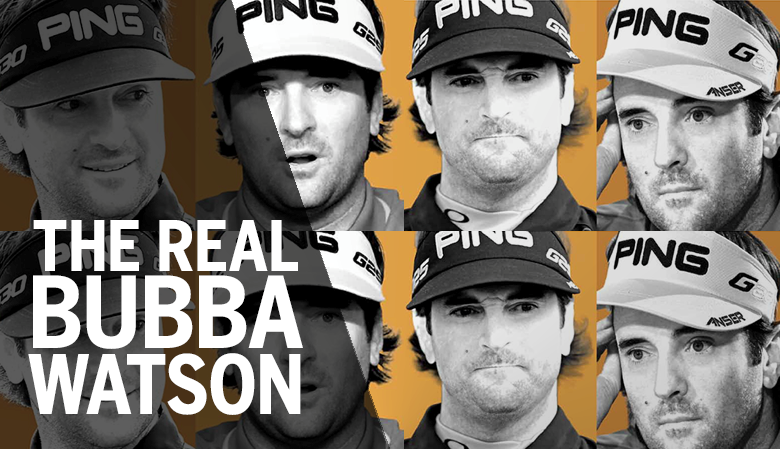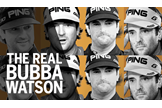Who is the real Bubba Watson?
Last updated:
It is day three of the 2012 Masters and Bubba Watson – one day shy of winning his first Grand Slam title – is playing with former Open champion Paul Lawrie. On the 1st tee Watson aims 40 yards wide of the right fairway bunker, then hits a huge Southpaw cut that starts over the trees and finishes in the middle of the fairway. “Ridiculous,” is the word going through Lawrie’s mind.
And there’s more. Having repeated that shape of shot with every (pink-shafted) drive, Watson arrives at the par-5 13th, a sweeping right-to-left dog-leg.
“If ever a hole sets up for Bubba to slide his tee-shot round the corner, it is that one,” says Lawrie. “But no. Aiming over the top of the trees on the left, he hit a massive hook. I looked at my caddie. Neither of us could believe it. I would struggle to clear those trees with a wedge and the ball teed up. But he blasted a driver way over the top. It was a joke. Of course, he then dumped a 9-iron into the back bunker when he should have hit wedge. But that’s how he plays. Bubba goes his own way, with no obvious rhyme or reason to anything. When he has an obvious shot, he does the opposite.”
Still, while it may be possible to question Watson’s strategy, there can be little argument that he is doing something right in the first major of the season. The man no-one calls Gerry anymore will arrive at Augusta National this spring having won two of the last three Masters. Only seven men – Horton Smith, Ben Hogan, Arnold Palmer, Jack Nicklaus, Nick Faldo, Tiger Woods and Phil Mickelson – have previously been able to make the same boast. He is keeping illustrious company.
Quintessentially American – born and raised in the Florida panhandle – Watson calls himself a “new age redneck” and owns the original ‘General Lee’, the orange Dodge Charger car featured in the television series ‘The Dukes of Hazzard’. Such an image has negative as well as endearing connotations, of course, and Watson lived down to the insular and ignorant half of that glib stereotype during a well-compensated visit to the 2011 French Open.
After shooting 76-74 at Paris National to miss the cut, Watson blamed his abject performance on a distracting mixture of crowd behaviour, ringing mobile phones and clicking cameras. Things got even worse when he dismissed three of the French capital’s most famous landmarks as “the big tower”, “an arch in the middle of the road” and “this building that starts with an ‘L’.” Versailles Palace was similarly denigrated as “that castle next to where I am staying”. Needless to say, none of the above went down well.
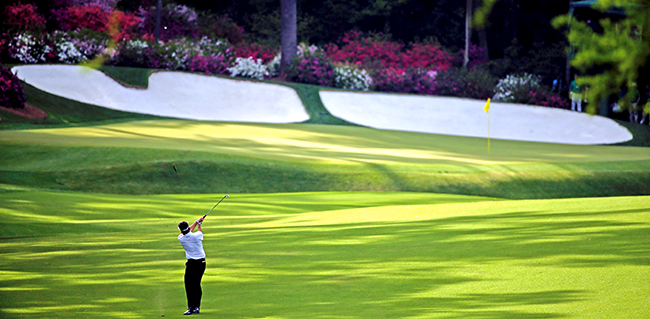
Since that blundering nadir, Watson’s public image has improved, but not across the board. In favourable press, he is portrayed as a God-fearing, happy-go-lucky family man devoted to his wife and two adopted children. All of which has some truth to it. But there is a darker side to Watson’s eccentric personality. According to many of his peers, he would comfortably win any poll designed to identify the most unpopular player on the PGA Tour.
“His weakness may also be his strength,” says one insider. “He gets criticism from other players because he moans and groans so much. He abuses his caddie terribly. But by not taking responsibility for anything, he passes the blame for bad shots. Mostly though, he is massively unpopular on tour because he is nothing like the image he portrays. He is seen as a phony. Most people are disliked for the same sort of reason – pretending to be something they are not. He is appealing to the public because he sells the ‘good old boy’ image of the lad from Bagdad (his home town in Florida). But he’s far from that. On the range he is a miserable so-and-so. He is a grumpy sod who thinks the world is against him. He sets up a siege mentality in his mind; it is he and his caddie against the world. He has admitted often enough he needs to behave better. Then the next day he is doing something else that disappoints. The word ‘hypocrite’ comes to mind.”
Strong stuff. But on the course, while he may not be the most fun to play with, there is little doubt Watson is enjoyable to watch. Instantly recognisable at 6ft 3in and left-handed, his unique swing gives new meaning to another word ‘unorthodox’. But in an age where technological advances have inevitably created near uniformity of technique at the top level, his distinctive method is more a hurricane of fresh air than a breath. In an era of straightness, Watson thinks in curves. No-one in the game shapes his shots more.
“Bubba ‘owns’ his swing,” says his agent, Jens Beck. “He has complete faith in it. I don’t think anybody is more talented than him. He can hit more shots than anybody. There’s a whole brand of shots only he can hit.”
“Playing with Bubba is a lot like a circus,” adds former European No.1, Robert Karlsson. “He always draws a crowd. Then there is the way he swings the club. It can be quite disheartening playing with him; he hits it so far.
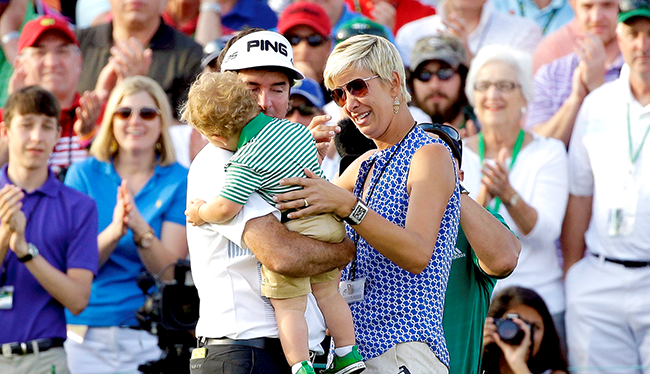
“I played with him for three of the four rounds in the 2011 US Open at Congressional. On the 18th hole, the wind was off the right and I pushed my drive. It didn’t go far. It wasn’t that bad though. But Bubba, after I hit a 4-iron to the green, had only 130 yards left for his approach. He must have been 80 yards past me after hitting this low cut that tumbled perfectly all the way down the hill. It was a beautiful shot.”
But how does he hit such shots when, to the layman’s eye, his backswing is almost impossibly upright and he all but jumps out of the way through impact?
“At first glance, Bubba has poor balance,” says leading coach Denis Pugh. “But he is using balance the way he uses his levers and his plane – the other two biggest factors in any golf swing. Bubba is a lever player. He has long arms and so can create a lot of lag. He also has a great deal of feel. And yes, he gets his plane way above the norm – he must have the most upright swing on tour. When you look at that, you think he must slice the ball off the planet.
“But he adjusts. He works the clubface over the release and gets his legs out of the way so that he can do things to the ball. His power comes from exceptional hand-eye co-ordination and those long levers. He couldn’t do it with short arms. Plus, he commits to a shape. If he tried to hit straight shots, he’d still be in Bagdad, Florida. No-one would have heard of him.”
They know who he is at Augusta though. On a course that all but perfectly fits the strengths of his game – huge length off the tee and standing to the right of the ball – Watson is already a Masters legend.
“He loves Augusta because he can fade almost every tee shot,” says Henrik Stenson. “That’s a lot easier than drawing every shot. Left-handers have an advantage there. They can ‘bleed’ their tee-shots round the right-to-left dog-legs. It is no coincidence that Mickelson has won three times there, as well as Bubba and Mike Weir.”
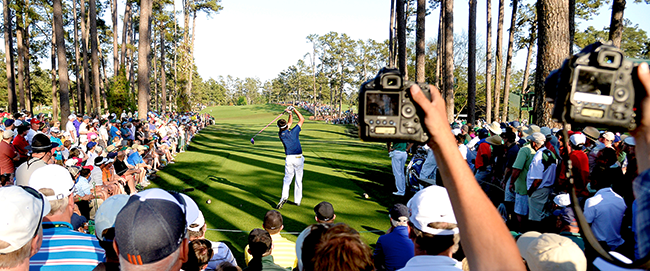
Watson can hit left-to-right too, though. No-one who witnessed it will ever forget the incredible approach he played in 2012 from trees right of the 10th fairway during the play-off with Louis Oosthuizen. A huge draw with a wedge, the shot finished maybe 12 feet from the cup. And two putts later golf had its first major champion called Bubba. “As soon as I hit the tee shot on 10, I thought, ‘oh no, I blew my chance,” Watson told the Augusta Chronicle. “There are thousands of people. There are hundreds of trees. There’s slope. Walking to the ball, I’m hoping and praying to myself; ‘just give me a shot, give me a swing. If you give me a swing, I can make a shot’.”
What a shot it was, one reminiscent of another two-time Masters champion, the late Seve Ballesteros. Not surprisingly, it is a comparison Watson relishes.
“My game isn’t based on hitting fairways and hitting greens,” he says. “It’s not based on a mechanical thing. It’s based on having fun, feeling a shot and pulling a shot off. And Seve loved the game, was passionate about the game and I hope it comes off that I am too. This is how I want to play. If I don’t hit the fairway, I’m going to pull this shot off.
“That’s what my dad always said. You hit the first one bad? Well, make the next one better. It looked like that’s where Seve’s thought process was. I hit a bad shot? Watch this, because the next one’s going to be amazing. If I miss that, this third one’s going to be even better. Bad shots are an opportunity to show off.”
Playing to the gallery is another aspect of the complex Watson character. Because of him, those gathered around the 1st tee at the last two Ryder Cups were free to make as much noise as possible – while Watson was teeing off. Ironically, however, such aplomb doesn’t seem to be working when it comes to winning and losing. In his three biennial jousts with the Europeans, he has accumulated only three points from 11 matches.
“Playing with Bubba is fun,” says Stenson. “He and I have had some great matches at the Ryder Cup. He is a good sport, always quick to congratulate the winners. He was very nice after Justin Rose and I beat him and Matt Kuchar at Gleneagles. ‘We played good,’ he said. ‘But you guys made 10 birdies in a row. That was great golf.’”
So what are we supposed to make of Watson? Is he a spoiled child? Or is he the man of perspective described by Stenson? Or is he a blend of the two, albeit a golfing freak? Does he really have a split personality, one for the public, the other private? Bottom line: Is he good guy or bad? As ever with Watson, ultimate verdicts abound.
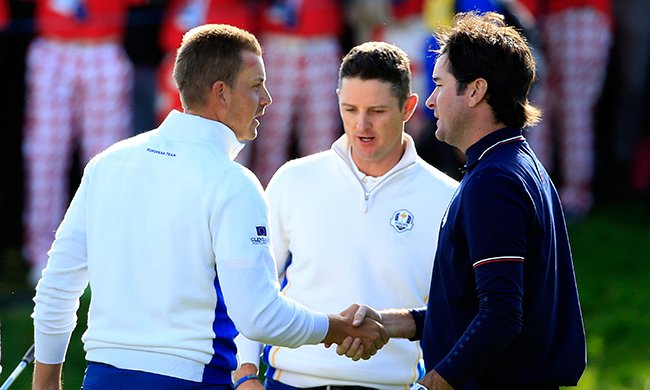
“Bubba is a big ‘God guy,’” says our anonymous (non) admirer, marching straight into one of the most polarising aspects of life on the PGA Tour. “He seems sincere in his faith, but like so many who make a big deal of their God, he makes that work for himself. It’s all ‘I’m working for Him’. But if there is a supreme being – which I seriously doubt – I hope his main purpose is not to see Bubba win golf tournaments. There has to be more to it. If five equally devout Christians are in contention on Sunday afternoon, who gets the nod from Him? And why? Did the losers not pray for as long or as hard as the winner?”
On the other hand, there is Daddy Bubba, the man who clearly dotes on his two kids. One month after his first Masters victory, Watson pulled out of The Players because he wanted to make a good first impression on his new adopted son. How can you not love that?
So who is the real Bubba? Is there anything he might do to pacify even the most strident naysayer? A wee suggestion. Drive down Magnolia Lane in the General Lee. Then screech loudly to a halt in front of the clubhouse. Any individual with the chutzpah to do such a thing has to be sound in both mind and body. Go for it Bubba. You know you want to.
